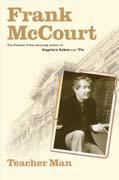 Teacher Man: A
Memoir, Frank McCourt (Scribner, 2005)
****
Teacher Man: A
Memoir, Frank McCourt (Scribner, 2005)
****
Anyone who enjoyed McCourt’s first two books, Angela’s
Ashesand ‘Tis will find the
same self-deprecating story
telling and humor in this third memoir. Memoir is an apt subtitle for this book because
unlike anautobiography, you just know as you read it that McCourt has embellished this
tale of his life as a teacher with more than a wee bit of Irish hyperbole. Despite this,
much of what he writes rings true for those who have taught, especially if your teaching
included some high school, and even more if it was in an urban situation.
Before becoming a famous author, McCourt taught high school
English for 30 years at several different high schools in New York City. He always felt
like an imposter because he didn’t believe that he knew how to teach and he
didn’t think much of the methods prescribed by his colleagues and administrators. He
discovered early on that he was not cut out to be an aloof taskmaster and stern
disciplinarian. It appeared that he’d be a failure as a teacher, further reinforcing
his belief that he was never going to succeed in life. His background of poverty and a
broken home seemed inescapable. But he was determined to try. His first and most difficult task was to get the
attention of the restless inner city youth who filled his classrooms. Threats and punishment didn’t seem to work.
He tried humor, instead, and often surprised his students with unexpected behavior. It
seemed to work. He gave somewhat unconventional assignments (write an excuse note from
Adam or Eve to God), conducted singalongs in class, and took his students on field trips
to city theaters. What worked best for him, however,
was to relate stories of his growing up poor in Ireland to his students. His
unconventional methods created conflicts with his principals and led to his teaching at
several different high schools before he ended up, ironically, at one of NYC’s best
high schools, Stuyvesant.
This book is really a tribute to those who teach our poorest and most difficult students and somehow manage to get through to them. It’s also a book about resourcefulness and survival. It’s filled with tragedies, successes—and humor. I strongly recommend it.